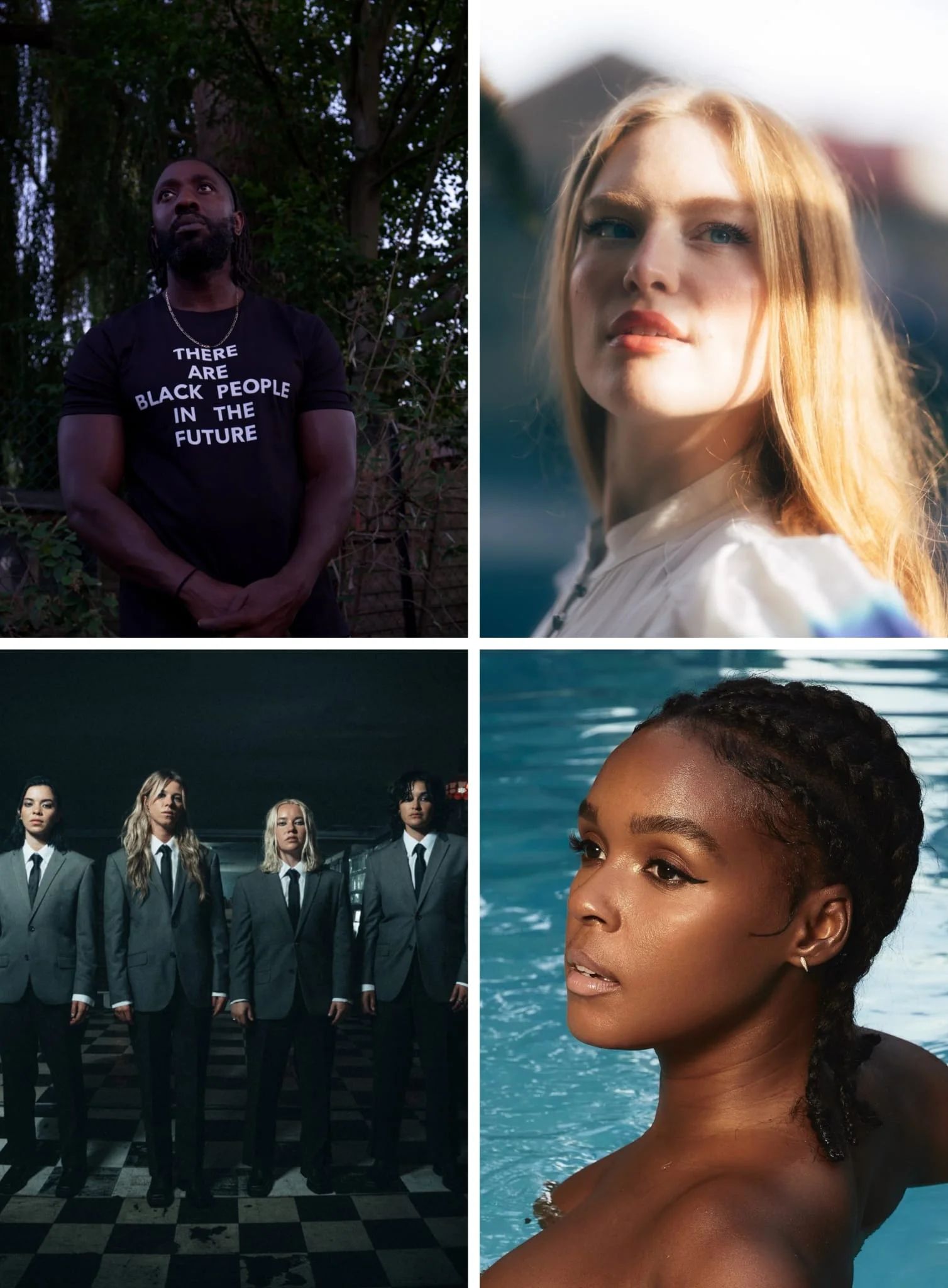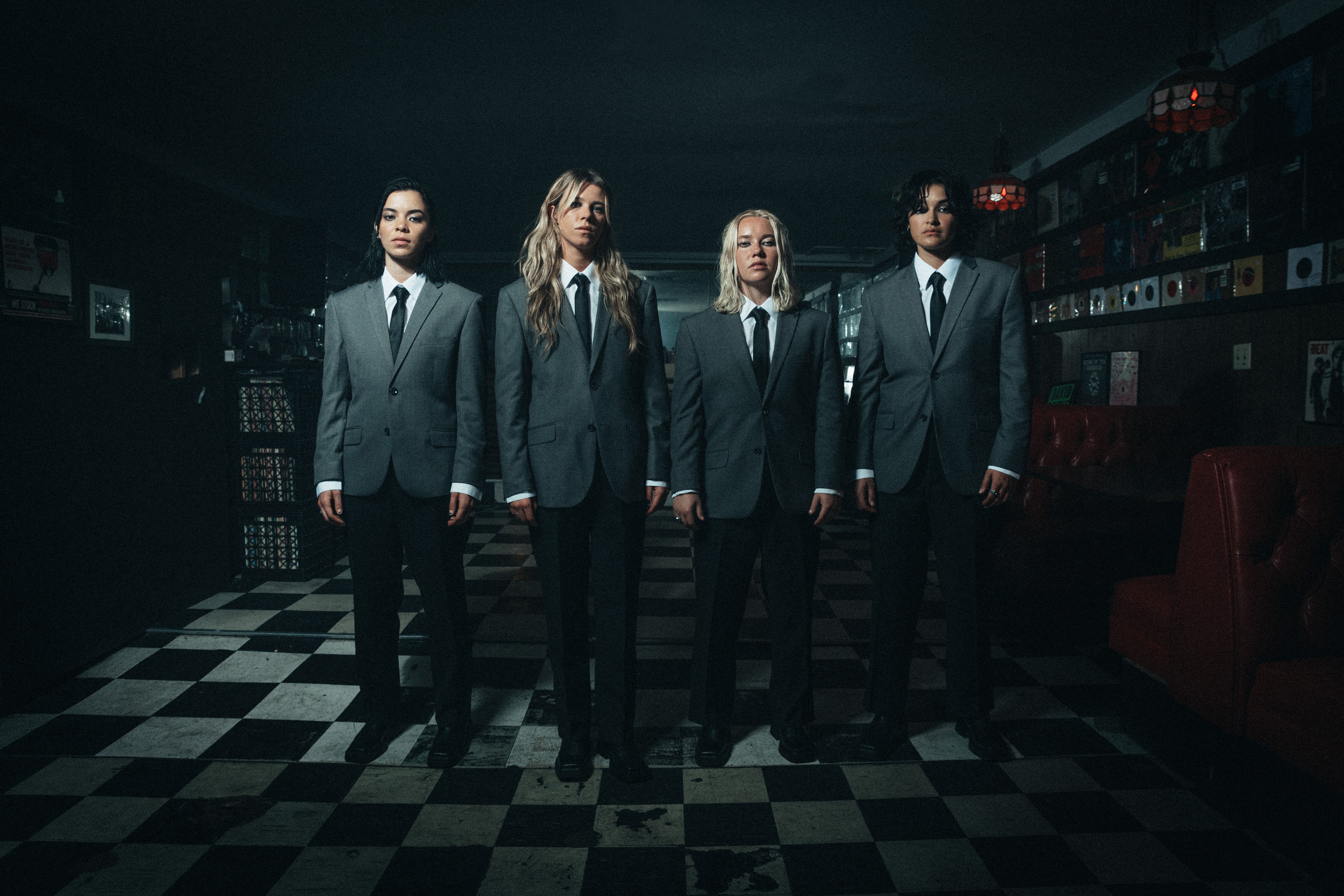
The Aces
Indie-pop quartet The Aces promise a nostalgic, tortured, and beautiful new era beginning with the announcement of their new album, I’ve Loved You For So Long.
For The Aces, a Utah to Los Angeles transplant indie band, known for pop bent hits and LGBTQIA+ anthems, vulnerability in songwriting is nothing new. Since their 2018 debut, When My Heart Felt Volcanic, they have often written candidly about the universal experiences of falling in love, sisterhood and modern femininity. On Under My Influence, their Sophomore record, sisters Cristal and Alisa Ramirez and their school friends Katie Henderson and McKenna Petty, built upon this sentiment, overtly acknowledging their queer identities in multiple tracks. In the three years that have followed they have continued to grow their talents and curate an ever expanding fanbase known for its positivity and sense of community. Their upcoming third studio album, I’ve Loved You For So Long finds the band more confident in their abilities and identities than ever before.
Unlike most of their past projects which focused on love and romance, I’ve Loved You For So Long, marks a new chapter for the quartet. Despite the title, it sets mental health and self-reflection center stage. An album the band says was written without expectation or outside influence, it serves as an avenue “back to basics” for both the artists and their audience. Always Get This Way, the lead single for the record, is a perfect starter for this new era. It showcases that while the subject matter may be somewhat new, the music itself is still intrinsically “The Aces.” It’s open and honest, while being simultaneously nostalgic and upbeat. It’s the ideal soundtrack for a late night drive, dancing in the kitchen or eventually singing in the midst of a crowd.
While on tour in London, the four women took the time to speak candidly with 1883 Magazine about the last year on the road, their journey as artists, what inspired the new single, and more.
Thanks for talking the time out of your busy touring schedule to chat with me. How has tour been?
Cristal: Good!
Alisa: It’s going great.
Katie: Really exciting!
McKenna: It’s been really good.
Good. I’m glad to hear it. I loved the show. I’ve seen you in LA and am a big fan. When The Vamps announced you were opening I was like, “Oh, this is perfect.”
Katie: Where did you see us in LA?
The Fonda. It’s one of my favourite venues. Me and a bunch of girlfriends went. We had a great time.
Cristal: That was a good show.
When you started touring again, was there anything you expected to miss that you didn’t or vice versa?
Alisa: Normally, when we open on a tour like this, we go out and do guerilla style meet and greets, so we can meet a bunch of people. That feels a little off limits now because it’s just more risk. There’s a lot more guidelines surrounding it, so we haven’t been able to just go out and be with fans, which is something we used to do a lot. That’s kind of sad, but also kind of a relief because it also takes a really long time. If you let everyone swarm you, you will be there all night. We like hanging out with fans, but it can be exhausting.
Yeah, I can understand that.
McKenna: It was surprising on Thanksgiving to not be super homesick because we were in the most beautiful part of England. We went to Oxford, got a little AirBnb and made a Thanksgiving dinner.
Alisa: We were in this super fancy, nice part of England. We had no idea. We just ended up there randomly. The Vamps team was like, “Oh, wow. You guys really went all out, I guess.”
[Laughter]
Alissa: It was really cute.
McKenna: It was so cute.
Katie: I loved it.
Cristal: Compared to America, everything here is cute and nice.
I feel the same way. My friends that live here are like, “What are you talking about? It’s normal.” Have you been able to play tourist a little bit?
Cristal: A little bit, yeah. Actually, this tour is not so jam packed, so we’ve had a decent amount of days off which is cool. In Oxford, we got to roam around the city and hang. In Manchester, we got a lot of downtime to shop and see the sights.
Alisa: It’s cool. On previous tours, we’ve been just “go go go” all the time. This tour has been nice because we’ve had more time to actually see England. We’re getting a pretty cool experience. It’s not often you go on tour and can say that you’ve actually seen the places you’ve been. We’ve been to Paris twice and we’ve never seen the Eiffel Tower.
Oh, my gosh.
Katie: Yeah.
Alisa: We will be in Paris for literally 24 hours and see the inside of a venue.
McKenna: When someone asks, “Have you been to Paris?” You’re like “not really?”
Cristal: I mean, technically? like not really, so it’s been really nice.
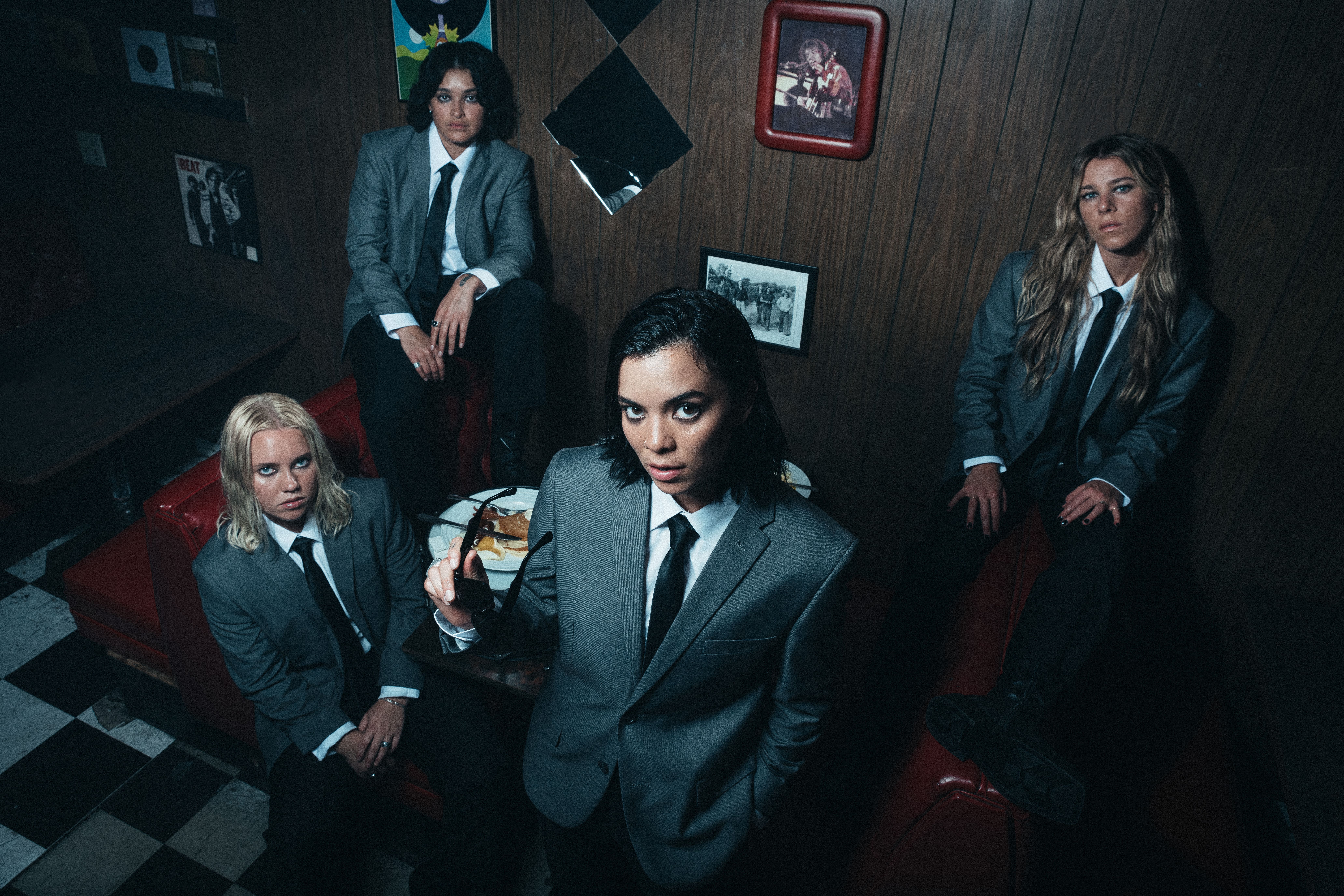
When I was at your LA show, I could tell that your show was a real safe space for many in your audience. Was that carefully cultivated or just a natural consequence of your fanbase?
Alisa: I think we’re really conscious of trying to create that vibe amongst our fanbase. We have a Discord we made so that our fans could find community and find friends. A lot of our fans are queer. We wanted to give them a space to find their chosen family and connect with other people like them. We’ve been intentional about trying to make a fanbase and a culture that’s pure and good. That doesn’t always happen. Sometimes, you go to a show and you can feel band culture is really intense and people fight and it’s kind of rough, so we’re really cognizant of that.
Cristal: I think that the fans are a reflection of that though. As a musician, you just want to get on stage and play music. You don’t know what’s gonna happen. You don’t know who your fans are gonna be. We are just so blown away by how sweet our fans are, how wholesome they are, and how they just want to create this community. They really took off with that. We just helped build it. We helped encourage it to grow. Our fans are incredible. I really believe that we have some of the absolute best fans in this industry because they’re so kind and respectful. Honestly, it is not even about us. It becomes about them in their community. That’s such an amazing thing to be part of. I think this is an industry you can very easily get in your own head. It can become about you and charts and sales numbers and all of these things. We’re so lucky to have a fan base that is about something real, so we try to help cultivate that.
Alisa: I think as an artist, the best way to get that and to protect it is by being cognizant of what you’re putting out, especially on social media and avoiding anything that feels negative or unnecessary. Your fans are a direct reflection of you and your energy and your brand. I’ve seen it across the board. Go to a Tyler, The Creator Show, you’re going to see a lot of people that think they’re Tyler, The Creator. It’s a mirror.
[Laughter]
Katie: On top of that, the band also started as a safe space for the four of us. It was a place where we were really safe and then that started to translate. I remember on the 5SOS Tour people started saying things like, “Thank you for making me feel like I can be out. I can hold my girlfriend’s hand here” and that kind of thing, but that’s what the band was for me before I was out. The only place I could hold my girlfriend’s hand was in the greenroom. I couldn’t do that anywhere else. I feel like that’s what translated to fans. It’s so cool to see that mirror.
Wow. That’s awesome! You played a number of pride festivals this past year. What was that experience like?
Alisa: Oh, so cool.
Cristal: It was crazy.
Katie: It was really interesting too.
Cristal: Yeah, super interesting. We live in LA, but we’re from Utah. We grew up really conservative and religious, so we know what that’s like deeply. But I think when you move out of your hometown, and you cultivate your own spaces, it’s easy to get comfortable and start to be like, “Oh, yeah, this is the way that my world is and the way that I see the world. I’m safe. I’m good. I’ve made it out.” Doing those pride festivals was such an intense reminder of how much work there is to do in the rest of the world outside of the big cities. There’s something about being on stage and seeing these people from conservative cities in middle America, like Indianapolis
McKenna: In my opinion, that’s the best one we played.
Cristal: Yeah. The energy is different over there. People come up to you, and they’re like, “Oh my God, Thank you so much for being here! Thanks so much for the representation.” It was fucking fun. We had a blast. It was fucking exhausting though because we’d be gone every weekend.
[Laughter]
Cristal: It was a major grind, but it was so rewarding. We were really lucky to be able to be part of all that.
How would you say it differed from a headlining tour, or even opening on a tour?
Alisa: In some places, it genuinely felt like a headlining tour. We headlined a lot of the festivals, so it felt like the same energy as playing Fonda or Webster Hall. There were tons of people coming out, a bunch of fans, and gay volume turned all the way up.
Katie: In LA, everyday is pride or at least it feels that way. Then you go to Indianapolis, where all these kids feel like they don’t have a place to celebrate and it just felt like people were ready to rage.
Alisa: They were ready. It was their time.
McKenna: It rained too at that show.
Oh, that’s cool.
Alisa: It was a nice sprinkle
Cristal: It was so cool.
That’s lovely. I love a good show in the rain. As artists, what’s the biggest difference of opening vs. headlining, if you feel like there are any?
McKenna: It’s a different energy. The approach to the show is different. With these openings shows, you’re trying to convert people that don’t know you yet. Whereas at a headline show you come in and everybody loves you. They’re there to see you. Honestly, I love the challenge of opening tours. From the beginning of the show to the end, you see people fall in love with your band and your music.
Cristal: It takes you back to your roots. It’s that same feeling as when we started playing as kids in our hometown and no one knew who we were. There’s a different mentality to opening.
Alisa: Yeah, because if people aren’t already giving you the energy that gives you the confidence to really put on a good show, you have to find it somewhere else or tap into something else. Sometimes you walk on stage and there’s a bunch of people just staring at you.
[Laughter]
Alisa: You have to try even harder. I think we perform the best when we’re opening. We have something to prove. We want to convince these people to fuck with us.
Katie: Nothing compares to a headline show, though. It’s so different when you have a whole room of people singing all the words.
Cristal: They’re both amazing. They’re just different headspaces.
Alisa: I totally get why some artists hate opening because it can be scary and intimidating. I remember when we first started opening, we had to learn to get good at it. It’s hard to go out when people aren’t giving you much. The first tours that we opened for really intense, small, alternative rock shows with a bunch of dudes in the audience.
Katie: You have no control over who shows up.
Cristal: It’s Russian roulette.
McKenna: We’ve been called whores while we were on stage.
No!
Cristal: We’ve had every type of experience, really bad ones and really good ones. We’ve opened for a lot of men. I think, for a band of all women, that can be intimidating. When you get on stage there’s a lot of preconceived notions of who you are, what you are going to be like, what you’re going to sound like, and if you’re going to be good or not. We’ve been playing in our band for so long that at this point, it just feels like second nature. Now, I don’t really give a fuck. But when we were younger we had to grow that thick skin. It can be scary. I salute people that do it.
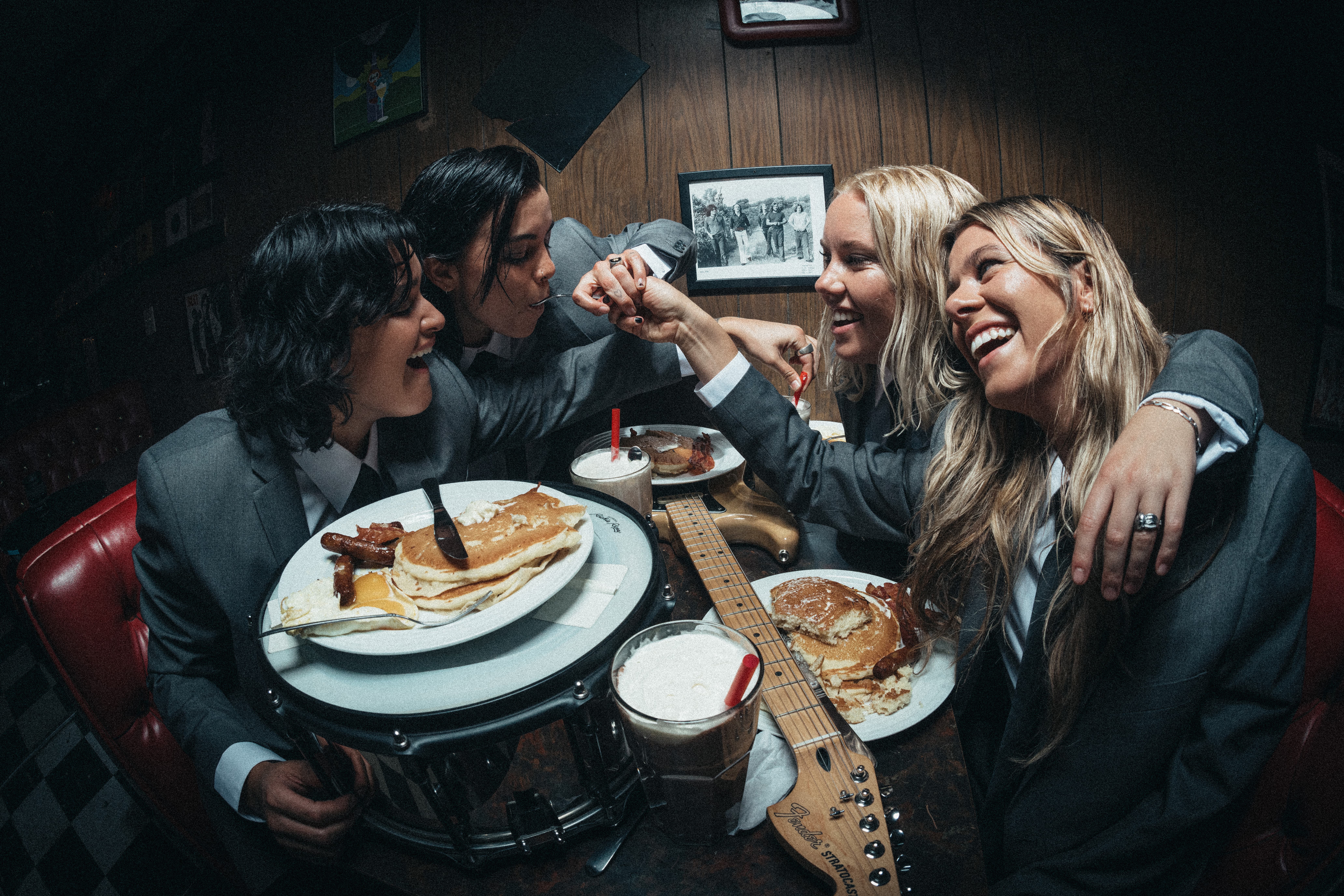
The crowd at The Vamps seemed great.
Cristal: Yeah, they were. They’re really sweet.
Alisa: This crowd is nice.
Katie: And so are the boys. As I said earlier, the fans mirror the band. They’re so sweet and the fans are so sweet too.
Alisa: This is the second proper “boy band” we’ve opened for and you never know. Sometimes the girls in the crowd are like, “Are you dating the boys?”
Cristal: Don’t worry. We’re too gay for that.
[Laughter]
Alisa: Honestly, we haven’t gotten anything like that.
Cristal: No. If anything, with The Vamps and 5SOS all their fans have been really welcoming and open armed, so that’s really encouraging.
You’ve just announced your next album, I’ve Loved You For So Long. As you move into your next era, how do you think you’ve grown as a band and as individuals since Under My Influence came out?
All at once: Oh boy. How have we grown? What a question.
Cristal: Well, you know, there was a pandemic.
[Laughter]
Cristal: I don’t even know where to start. When we went into writing this new record, there wasn’t an intention to write a record. We had just put out Under My Influence. We were devastated by the fact that we couldn’t do anything around it. There was no tour. There was nothing. We were just sitting around yelling into the void of Instagram and Tiktok. We worked on this album for a year and a half only for it to feel like no one cared. It was disheartening and really hard. There was a major grieving period for us. We needed to realize all the work we put into ‘Under My Influence’ wasn’t going to come into fruition in the way we worked so hard for it to. We weren’t creative at all for six months. Eventually, Alisa and I were like, “Well, we should just go write because what the hell else are we going to do?”
Alisa: It was the only way to get out of the house.
Cristal: We were calling our label saying, “Okay, if we get COVID tested, and there’s just one person in the studio, can we go do sessions?” We finally got approved to do it. It was the only way we could put an outfit on and go anywhere. But, we were so down that there were no expectations.
Alisa: We were just coping.
Cristal: What transpired was a really beautiful record making experience from this place of real innocence and connection back to who we are as people more than anything. It was a real hard look in the mirror asking why are we in our band. Why do we do this? It started to become about what felt good. I think we’d lost that a bit. Not that we weren’t enjoying ourselves, but I think that hustle and grind of wanting so badly to be successful and coming from a small town where it really matters if we are successful had worn us down. It’s our life and our livelihood.
Alisa: Yeah. We’re not nepo babies who can just fucking vibe. We have to make money.
[Laughter]
Cristal: Exactly. You start to enjoy it less when you start to really care about what people think about you. With I’ve Loved You For So Long, because of the world shutting down and everything not mattering anymore, except the people you love and what you love to do, our only goal making the record was for us to love it which we do. From top to bottom, it’s something we all got to make together and we had fun doing so. We went back to the way that we made music when we were kids. We got in the studio together and just jammed in a room and wrote songs. We hadn’t done that in years. Anytime Keith [Varon], our producer, would try to change stuff or polish stuff, we’d tell him he wasn’t allowed.
[Laughter]
McKenna: We’re such different people now too. Creating this record was a really humbling experience.
Cristal: A major ego death.
McKenna: It completely restructured how we do things, how we approached our careers, and how we manage our relationships with each other. Individually, we’ve all worked on ourselves and had huge growth spurts throughout the past couple of years.
Alisa: Yeah. I’m so excited to be the new people we are out in the world.
[All agree]
Alisa: The pandemic happening was a cultural reset, especially for our generation. This record couldn’t exist if that hadn’t happened, to be honest. It was so easy to stay in the motion of every day and not think about your life more deeply. The pandemic forced you to be isolated to be like, “Fuck. Why do I do anything that I do?” That’s really where the record came from. We spent so much time on Under My Influence. When everything that was set up for it got slashed, our expectations were just destroyed. I, personally, began to think, “Do I like this record as much as I thought I did now that it’s not doing what I wanted it to?” I had to have a look in the mirror as an artist and a songwriter and ask, “Why am I making music? Is capitalism and commercialism influencing my art too much?” I came to the conclusion that it was. I never want to do that again. I don’t care how any of our music performs further. I don’t want to create anything with a thought of “Will this do well?” again. That’s sometimes an inevitable thought when you’re not a nepo baby.
[Laugher]
Alisa: We feel more purposeful and happy when we’re making things that feel pure and authentic to our artistic expression and experience. That’s why we were so protective when we were making this record.
Katie: I remember going into a studio together with the intention of writing for a few more weeks. But, when we brought up all the songs we’d written so far, the record was just staring us in the face.
Cristal: Another thing that was really special was that we really didn’t write a lot. We wrote the songs on the record and that was pretty much it. We didn’t want to overwrite. That’s something that can happen a lot. We wrote around 60 songs for Under My Influence.
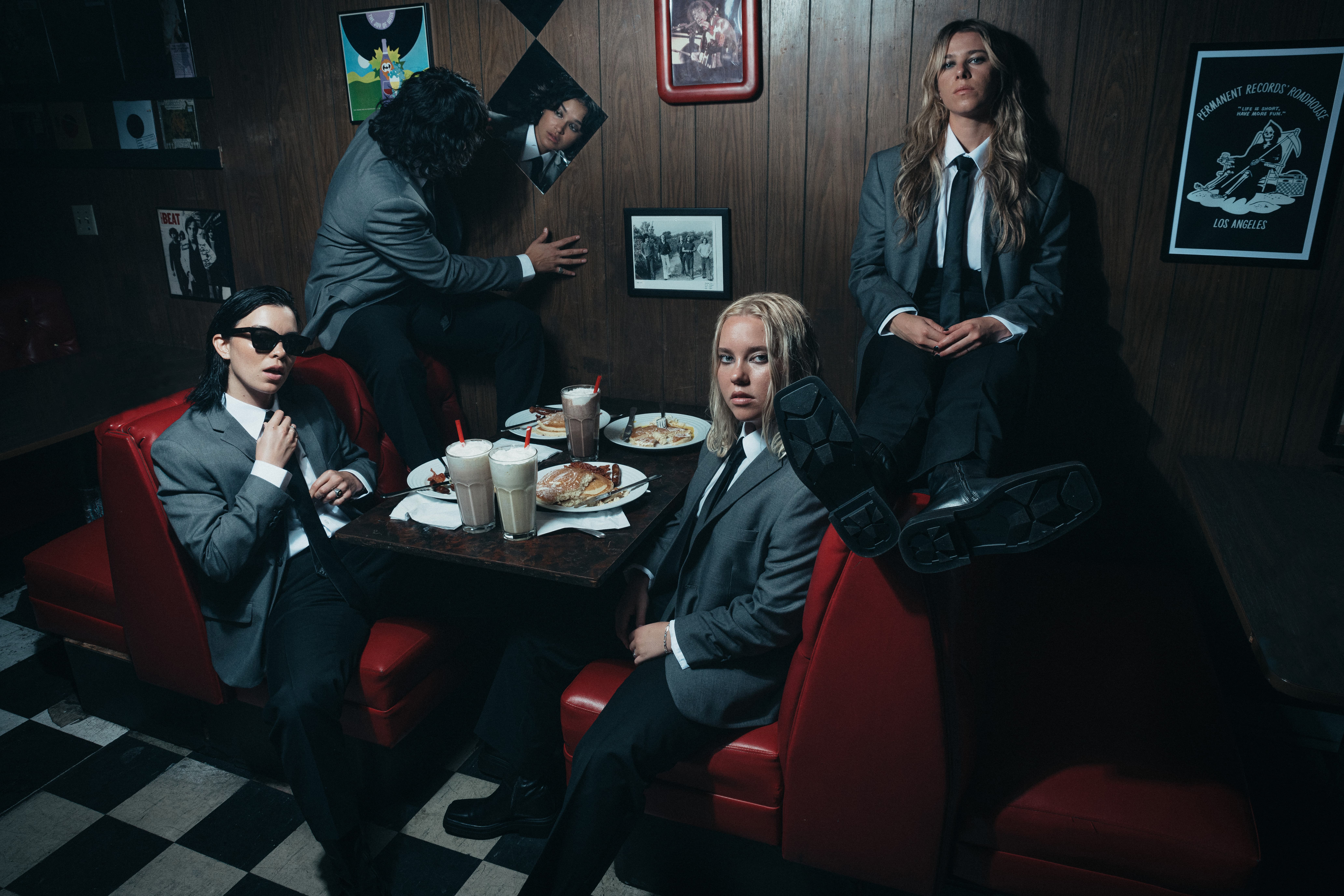
Oh, wow.
Alisa: That was a really traditional pop record. We were going for the catchiest, smash-iest, bops possible from a very authentic place. Under My Influence was the first time we ever acknowledged our sexuality in a song. It was a very artistic record, but we grinded five days a week trying to write the best songs we could possibly write and then whittled it down to the most competitive 14 songs.
Cristal: This was the opposite. I didn’t want to write a lot. I wanted to feel something, really love it, and work on it over time.
Alisa: Once we caught that feeling, we chased it. Once we started figuring out what the narrative was with this album, the puzzle pieces started coming together. We told a story.
I think I know the answer to this question, but would you consider songwriting therapeutic?
Cristal: Absolutely, More so now than ever for me. It’s interesting. When you’ve been doing something for as long as we’ve been doing this, you show up as so many different people doing the same thing. When you first start doing something, especially something that’s creative, a lot of the time it’s from a place of excitement and exploration. There’s no stakes involved. But then, when you make something creative your career, that changes. On ‘I’ve Loved You For So Long,’ songwriting started to become like it was when I was a little kid again because I was writing for me. We wanted to authentically tell our stories in a way we never had before. The songwriting on this new record was very therapeutic.
Katie: You can totally hear how this record is coming from real experience. It’s not so much about love as our past albums have been. It covers a lot of topics. The writing makes it so obvious that it comes from very real places.
Cristal: We worked through a lot of shit on this album.
McKenna: On the production there was so much space to get back to how we used to play together as kids. I loved working with just one producer. It was so uncomplicated.
[All agree]
Cristal: I think, and this especially applies to women, you’re taught that if you’re doing something cool and you get attention for it when that makes people try to tell you how to do it that you must be doing it incorrectly. But, we got ourselves here. Maybe you don’t like what we are creating, but we’re here for a reason. It feeds into your self doubt. Obviously, you always want to push yourself to be better, but on this record I just wanted the girls to show up as they were. I didn’t want to fuck with what they were doing very much because that’s their unique way of playing. I want people to hear that. There wasn’t too much picking apart. It was very like, “Feel it. Go with it. That’s fucking sick.”
Katie: It wasn’t like that on the last records, especially with all the moving around and working with tons of producers.
McKenna: Yeah. Everyone has different ways of doing things. Plus, being a young woman in a session means you already have a mark against you when working with only men.
Cristal: Luckily, we picked Keith. He is amazing and really gave us the space to do what we wanted. He just elevated it. That was really special.
Now that we’ve talked a little bit about how the writing process for this record was different, for somebody who is a fan of your music, how would you say this new record differs from the past albums?
Alisa: I’d say this record is more alternative and intense. But also just more in general.
Cristal: If you’re an OG fan of The Aces, this record is going to be your favourite. It’s the purest form of who we are at this point. When you make anything creative, especially when you’re young, you’re throwing darts a bit. You’re trying to hit this thing that’s in your head. When you’re collaborating with people sometimes that can come out different than you thought originally. As you keep going you get better at hitting that mark. This is our third album. We’re hitting the bullseye. It’s exactly what we wanted.
Alisa: This record couldn’t have happened before this point in our career. I think that sentiment of “you have to employ the rules to know how to break them” is very true on this record. With ‘Under My Influence’ we really cut our teeth as songwriters. Coming into this record we wanted to make authentic, cool, emotional stuff. Again, it was chasing the feeling and making the feeling stronger and more intense.
Katie: Not to speak for your [Cristal’s] experience, but had you not written so many songs for the second record, you probably wouldn’t have been able to approach this record like you did.
Cristal: Definitely. As you get older, you can look back on your life or your experiences and be like, “that all led me here. I needed to do all of that.” All of our creative experiences have led us up to ‘I’ve Loved You For So Long.’ Without everything we’ve been through we wouldn’t have been able to make it. We’ve chilled out a bit.
Alisa: We’ve all grown up.
McKenna: We had to make all of our mistakes and learn who we were in the limelight. We were making records while learning about the music industry and learning how to be women in the music industry. We finally got to an age where we know who we are and what we want.
Cristal: There’s so much peace around this record. Usually when you make a record there’s a lot of anxiety because you want people to like it. You want it to be good. Especially when you’re younger and you don’t really know who you are yet. There’s so much anxiety that forms around with that. Now, it is what it is. I’m so pleased and so proud of what we made. I feel so calm. It feels like it’s all falling into place because we’re like letting it fall into place.
Alisa: Part of it is just time. If you look at artists catalogs, they start to really figure it out about three albums in. It takes time to figure it out. We’re first generation artists. We didn’t grow up around other artists. We didn’t know a lot of things that kids that grow up around artists inherently do. It takes longer to figure the industry out or how you make authentic art as a young person. It’s been a journey.
Along with the album announcement, you also just dropped Always Get This Way. What inspired the song?
Cristal: ‘Always Get This Way’ was one of the first songs that we wrote. At that point we were still just writing to cope with the pandemic. We weren’t making an album. I was having really intense panic attacks at the time. I have always had a pretty bad anxiety disorder, but they were so bad that I was having a hard time leaving the house and even sleeping. I was miserable. In the studio, Alisa was like, “I feel like we should talk about your anxiety in our songs. We should talk about what is going on with us.” At first, I was unsure. I didn’t really know how to write about it. In the past, we had mainly focused on love and relationships in our writing. That’s different from writing about life experiences. It feels more personal. But Alisa coaxed Always Get This Way out of me.
Alisa: I knew she could get there.
Cristal: The really intense panic attacks that I was having were a real learning moment for me. Alisa & I have an older brother who is pretty severely bipolar. When he was first getting diagnosed. I remember our whole family feeling frustrated with his behavior and not having much patience for him. I’m not bipolar and I don’t want to act like I know what that feels like, but with how crippling my anxiety was and the fact that I wasn’t sleeping because of it, led to me acting like an asshole and I could feel people getting annoyed with me. I wanted to be like, “I wish you could feel how annoyed I am at myself. This fucking sucks.” It gave me a lot of compassion for my brother and made me aware of how as a society we don’t have patience for people who struggle. There’s this mentality of, “Ugh. What is wrong with you? Why can’t you get it together?” The song is about that. It’s about begging people to be nice to you while you’re mentally in Hell. The song reflects that musically too. My voice is at the peak of screaming the whole time. It’s a perfect representation of the mental health system in America and the perception of those that struggle with mental health issues.
Alisa: It’s kind of an extension of Don’t Freak, which is the first song we wrote about mental health. We wanted it to kick off the record because this album is largely about mental health, inner child work, and reflecting on the things that happened to you when you were younger and how those experiences don’t just go away because you’re older and have moved out of your oppressive, religious town. It’s still there. There needs to be space for it. It needs to be acknowledged because it will affect your life if it isn’t.
Cristal: The whole album is a lot of past/present reflection. Some songs like ‘Always Get This Way’ are current day experiences. Others are about reflecting on our childhood and realizing that the experiences we had then might be where that anxiety stems from. The songs are about the same problems under different circumstances and the need to work through and acknowledge them.
Finally, give me three words to describe I’ve Loved You For So Long.
Alisa: Oh. I like that. I would say: Nostalgic. Tortured. Beautiful.
Cristal: I love that.
McKenna: That’s great.
Katie: I think that’s the perfect answer.
The Aces’ new album ‘I’ve Loved You For So Long’ is out 2nd June via Red Bull Records, pre-save here. New single “Always Get This Way” is out now, listen here.
Interview Sydney Bolen



